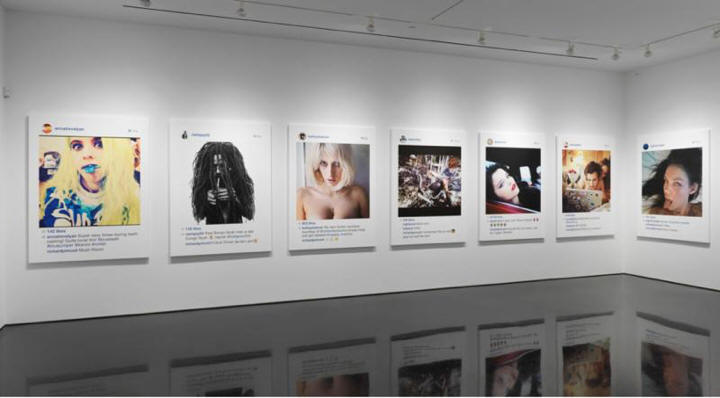Newsletter Issue 76 - June 2015
In this issue:
Copyright piracy
Taylor Swift v Apple
Dead patents are dead
Ask Dr. Copyright ...
Dear Doc:
Back in April 2013, you wrote about how Richard Prince drew a few
electric guitars and naughty bits on photos taken by photographer
Patrick Cariou, and then sold them to Beyoncé, Giselle, and other
really famous people for tons of money. I seem to remember that a
court said that was okay, and not an infringement on Cariou's
copyright, or some such idiocy. What's Prince been up to lately?
Signed,
Patrick C.
Dear Pat:
Dick's been up to it again. Most recently, he downloaded a bunch of
photographs posted to Instagram by other users, added his own
comments, and printed these out on big canvasses. He has shown these
in the Gagosian Gallery (the same one that sold the Cariou markups)
for (are you sitting down?) around $90,000 each. The folks that
posted their photos on Instagram have confirmed that Prince never
asked for their permission to do this...he just downloaded the
images, printed them, and sold them. (Interestingly, the press
release for the exhibition notes, "All images are subject to
copyright. Gallery approval must be granted prior to reproduction.")
So what do art critics (at least some of them) think of Prince's
work? Jerry Saltz, from New York Magazine, writing on the website
"Vulture" gushed, "Here he [Prince] is delving as deep as he ever
has into privacy, copyright, and appropriation, twisting images so
that they actually seem to undergo some sort of sick
psychic-artistic transubstantiation where they no longer belong to
the original makers."
Some of the Instagram photos that Prince used were posted by the
founder of the website "SuicideGirls." In response, she said on
Reddit:
"Everyone has been asking me what I thought about famous
controversial artist Richard Prince taking a series of SuicideGirls
Instagram posts and printing them out and selling them at a recent
gallery show at the gagosian gallery of beverly hills for $90,000 a
piece. My first thought was I don't know anyone who can spend
$90,000 on anything other than a house. Maybe I know a few people
who can spend it on a car. As to the copyright issue? If I had a
nickel for every time someone used our images without our permission
in a commercial endeavour I'd be able to spend $90,000 on art."
In reaction, she decided to make Prince's "art" affordable:
"...I'm
just bummed that his art is out of reach for people like me and the
people portrayed in the art he is selling. So we at SuicideGirls
are going to sell the exact same prints people payed $90,000 for $90
each. I hope you love them. Beautiful Art, 99.9% off the
original price... Do we have Mr. Prince's permission to sell these
prints? We have the same permission from him that he had from us."
According to the Copyright Office's Circular 14, "A derivative work
is a work based on or derived from one or more already existing
works. ... Only the owner of copyright in a work has the right to
prepare, or to authorize someone else to create, an adaptation
of that work. ... The unauthorized adaption of a work may constitute
copyright infringement." Because nobody has yet brought a law suit
against Prince over these Instagram pictures, we may never know
whether his actions actually constitute copyright infringement. Past
cases, like that the "Doc" wrote about in 2013 over the Cariou
photos, lead us to believe that as long as people who are famous
continue to pay $90,000 each for them, judges will keep looking the
other way.
Want to just blatantly steal someone else's copyrighted work? Don't
have a hoity-toity New York art gallery that will sell the stuff for
big bucks? Better check with the attorneys at LW&H first. After all,
in much of the country outside the Second Circuit, copyright law
still protects the little guy, and you could get in really big
trouble for infringing copyright.
Until next time,
The Doc.
Taylor Swift versus Apple versus Photographers

On the subject of interesting IP spats, here's one that's worth
smiling (or frowning) over. You may know that
Taylor Swift recently
complained in an open letter to Apple about its using musicians'
work without compensation during the 3-month trial period of its new
music streaming service (which, by the way, debuts today). Swift
wrote:
"I find it to be shocking, disappointing, and completely unlike this
historically progressive and generous company.... This is about the
new artist or band that has just released their first single and
will not be paid for its success. This is about the young songwriter
who just got his or her first cut and thought that the royalties
from that would get them out of debt. This is about the producer who
works tirelessly to innovate and create, just like the innovators
and creators at Apple are pioneering in their field...but will not
get paid for a quarter of a year's worth of plays on his or her
songs."
Of course, she's saying that Apple is using other artists'
copyrighted works for a three-month period without paying royalties
or license fees. Apple capitulated and "voluntarily" agreed to
compensate artists during the trial period.
Now, it gets interesting.
A photographer, Jason Shelton, caught wind
of Swift's efforts and in an open letter to Swift remarked that she
was a hypocrite. Shelton wrote that if Swift meant what she said
about musicians then she should re-examine the way she treats
photographers. In the same post, Shelton cites a copy of one of
Swift's company's "Concert Photo Authorization Form" and points to
paragraphs that grant Swift "free and unlimited use of our work,
worldwide in perpetuity." Shelton writes, "you seem happy to
restrict us to be paid once, and never being able to earn from our
work ever again, while granting you the rights to exploit our work
for your benefit for all eternity..." He also explained to Business
Insider that concert photographers typically gets paid only if the
photos are used.
In response, Swift's UK representative told the Business Insider
that Shelton misrepresented the contract and that it "clearly states
that any photographer shooting the 1989 World Tour has the
opportunity for further use of said photographs with management's
approval" and that the contract did not transfer the copyrights to
Swift.
That's not the end of it. About a week ago, a UK - based freelance
photographer,
Joel Goodman, tweeted a copy of the new contract for
Swift's latest 1989 World Tour. That contract restricts
photographers to one use of any photograph taken at the concert and
prohibits the photographer to use such photographs for any other
purpose. Conversely, it grants Swift's company perpetual, worldwide
rights to use the photographs. And then the kicker, it gives Swift's
company the right to destroy a photographer's equipment should he or
she breach the authorization!
Does Shelton have a point? Are music and photographs artistic
equivalents? Is Swift taking advantage of unequal bargaining power
over artists just as Apple did? All good questions. We suspect
that we'll hear more about this….
No Zombie Patents!
On June 22 the
Supreme Court decided yet another patent case - this one relating to
patent royalties after the patent expires. In 1964, the Supreme
Court in the Brulotte case determined that even with a
contract, a patent owner cannot collect royalties for making, using
or selling an invention after a patent expires. The Brulotte decision has been severely criticized by lower courts
and by academics.
The Supreme Court revisited the subject in Kimble v Marvel on June
22, 2015. Kimble invented a Spider Man-type web slinger to shoot
silly string from the palm of the hand and received a patent in
1990. Marvel copied the invention, and Kimble sued. Kimble and
Marvel settled the litigation, with Marvel agreeing to pay a royalty
to Kimble for as long as web slingers wanted to sling web. Marvel
later learned of Brulotte and filed suit in 2010 asking to be
relieved of the royalty obligation when Kimble's patent expired.
The Supreme Court agreed with Marvel and refused to disturb Brulotte
based on judicial inertia, known to judges and those that fawn over
them as 'stare decisis.' 'Stare decisis' generally means that once
a court decides a matter in one way it will continue to decide the
same question the same way in future cases, unless there is a good
reason to change. The majority noted that Congress had fifty years
to fix Brulotte if it wanted to do so, but has not. The majority
also noted that parties can draft contracts around Brulotte by
having payments after a patent expires correspond to making, using
or selling the invention before the patent expires.
The Supreme Court dissenters view Brullote as wrong-headed judicial
activism with no basis in the patent statute and dismiss the
majority's argument on inaction by Congress because passing a patent
law is really difficult.
In short, Brulotte is still good law and patents die on their
expiration dates. Brulotte and Kimble must be considered in
negotiating patent license agreements.

